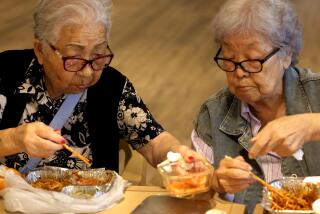Center Helps Ease Isolation of Elderly : Facility for Asian Patients Suffers From Frail Financial Health
When 74-year-old Lily Wong came to the Central Adult Day Health Care Center near Echo Park Lake in November, she could barely walk.
Crippled by Parkinson’s disease, she spent much of her time confined to her bed.
The disease had atrophied her muscles, and her psychological health had deteriorated as well.
“She literally dragged herself into our center,” recalled nursing assistant Grace Ho. Social worker Zvi Galibof, himself an emigrant from Israel, said: “She said to me, ‘What is the use of making efforts to walk when I will come nowhere with it?’ ”
But since her first visit to the center nearly a year ago, Wong has learned to cope with the degeneration that comes with Parkinson’s.
She is now able to walk with assistance, and she has hope for the future.
“Before I came here, I ask God to take me away,” she said, her voice barely audible above the din of the lunchtime gathering at the center. “They’re very kind to me here.”
Wong is one of about 30 seniors who regularly attend the center. The state-licensed facility, which is in the recreation hall of St. Athanasius Episcopal Church, provides bilingual nursing services, occupational and physical therapy, exercise classes and nutrition counseling to its largely Asian clientele.
Various Illnesses
Many of the center’s patients suffer from various illnesses associated with aging, such as Alzheimer’s disease, hypertension, arthritis, diabetes, post-stroke conditions and cardiac complications.
The center uses group activities to counter the sense of isolation felt by many seniors. “The socialization process is one of the most beneficial,” Ho said.
To illustrate this philosophy, a large sign across one wall reads: “Friends are good medicine.”
Alice Tsou, the center’s founder and administrator, said she started the center to help the many elderly, non-English-speaking people who came to Los Angeles from Asia.
“They weren’t getting appropriate treatment,” Tsou said. “They couldn’t communicate with the nurses and doctors. Gestures don’t interpret what you really want or need.”
But despite its success with patients, the center’s financial health is as frail as that of many of its patients.
The center was opened in August, 1987, with a $50,000 grant from the state Department of Aging and funds from private foundations and individuals.
Since then, the center has struggled to survive on an annual budget of $140,000.
Much of the funding comes from medical reimbursements, $45.85 per patient per day, from the state Medi-Cal program.
Tsou said 30 people must attend the center every day, double the present average daily attendance, to make it self-sustaining.
She estimated that the center receives $110,000 a year in services and supplies donated by French Hospital, which is in Los Angeles’ Chinatown; the Los Angeles County Food Bank, which provides food for the daily lunches, and volunteers.
Financial Ailments
To add to its financial ailments, the center may have to relocate.
The center’s site is slated for demolition within the next two years when the Los Angeles Episcopal Church begins work on its new diocesan center.
In preparation for the demolition, the church changed the center’s year-to-year lease to month-to-month in December.
Father John Bruno, rector of St. Athanasius, said he has reminded Tsou several times about the new lease terms and the possibility that the building housing the center could be demolished as early as next summer.
“I don’t have time to look for another place,” Tsou said. “I looked at 30 places before I found this one. It’s hard for me to think of looking all over again.”
More to Read
Sign up for Essential California
The most important California stories and recommendations in your inbox every morning.
You may occasionally receive promotional content from the Los Angeles Times.










